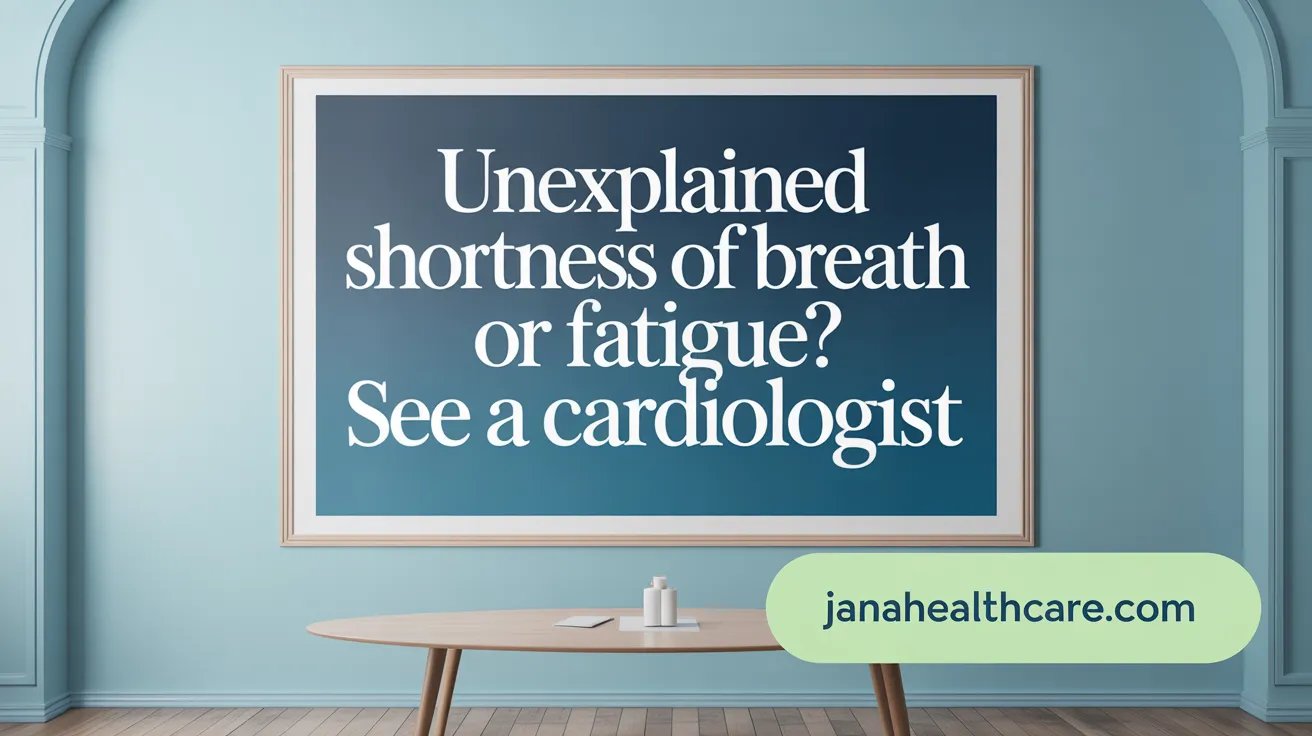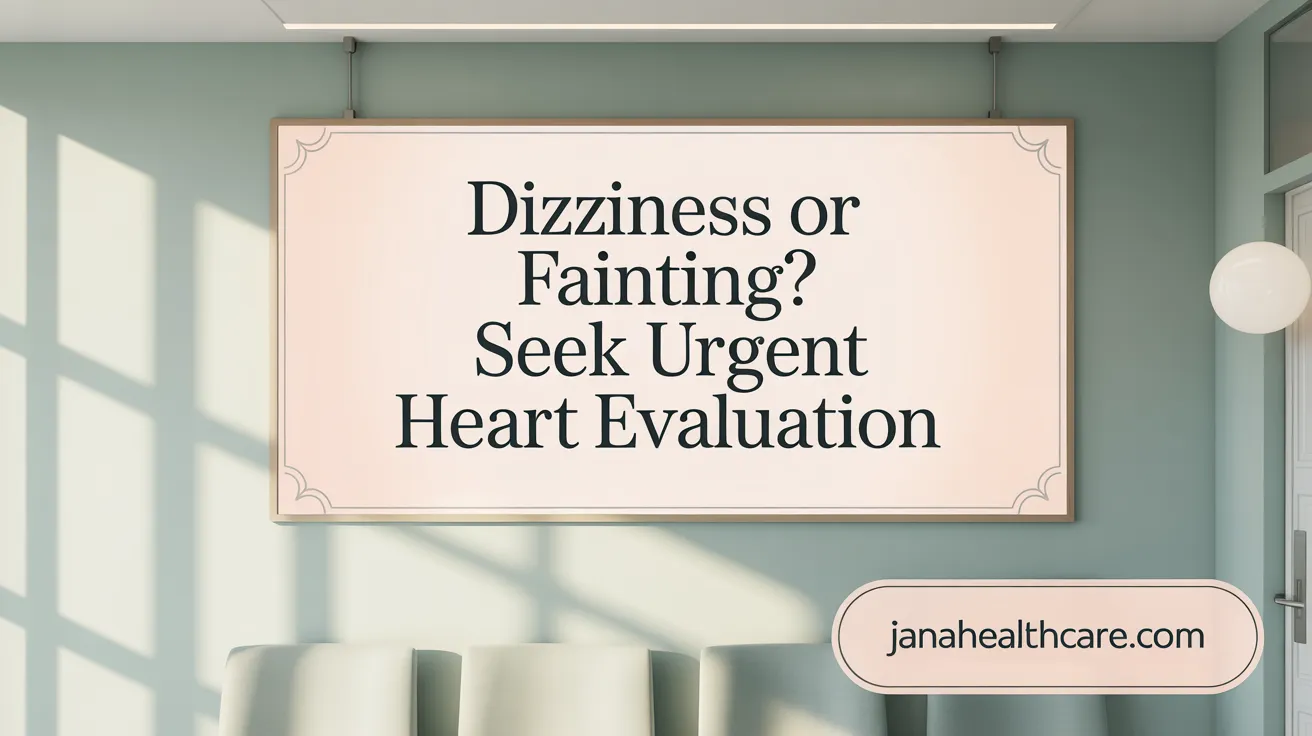Understanding When to Seek Cardiology Care
The Importance of Early Cardiology Evaluation
Early consultation with a cardiologist is crucial for detecting and managing heart disease before it progresses. A cardiologist specializes in the heart and blood vessels, offering expert diagnosis and tailored treatment to prevent complications such as heart attacks or heart failure.
Overview of Heart Disease Risk Factors
Several factors increase the risk of heart disease, including high blood pressure, high cholesterol, diabetes, family history, smoking, obesity, and inactivity. Recognizing these risks allows for preventive strategies like lifestyle changes and medications.
Why Recognizing Symptoms Early Saves Lives
Symptoms such as chest pain, shortness of breath, palpitations, dizziness, or swelling in the legs should never be ignored. Timely evaluation can lead to early intervention, reducing the chance of severe outcomes and improving long-term heart health.
Key Facts on Heart-Related Symptoms and Risk Factors
- Persistent chest pain with pressure, tightness, or heaviness is a warning sign for angina or heart attack.
- Unexplained shortness of breath and fatigue can indicate heart failure or coronary artery disease, affecting daily life.
- Irregular heartbeats or palpitations such as fluttering or racing often signal underlying arrhythmias like atrial fibrillation.
- Swelling in legs, ankles, or feet, known as peripheral edema, suggests heart failure due to blood pooling caused by decreased heart efficiency.
- High blood pressure, often silent, strains the heart, leading to thickening, stiffening, and increased risk of heart failure, stroke, and heart attack.
- Dizziness, lightheadedness, and fainting linked to abnormal heart rhythms require urgent evaluation to prevent complications.
- A family history of early heart disease significantly increases individual risk, necessitating early cardiology assessment.
- Conditions like diabetes, kidney disease, smoking, and high cholesterol elevate heart disease risk, highlighting the need for preventive care.
- Early cardiology evaluation involves risk assessment, diagnostic testing, lifestyle review, and preventive strategies to mitigate heart disease.
- Proactive management through lifestyle changes, medications, and routine monitoring can prevent or delay serious heart conditions and improve health.
1. Persistent Chest Pain or Discomfort

What kinds of chest pain should prompt a cardiology evaluation?
Chest pain that is persistent and presents as pressure, tightness, squeezing, or a sensation of heaviness requires prompt attention. This type of pain often worsens with physical activity and may spread to the arm, neck, jaw, or back. Such symptoms are classic indicators of angina causes and symptoms or even a heart attack.
Chest discomfort linked to coronary artery disease is a significant warning sign. This condition occurs when arteries supplying blood to the heart muscle become narrowed or blocked, leading to reduced oxygen flow. The pain reflects the heart's distress due to insufficient blood supply.
Symptoms to watch for include chest tightness or heaviness that does not improve with rest, pain radiating beyond the chest, and accompanying signs like nausea, sweating, or shortness of breath and heart conditions. These can all signal serious cardiac events and warrant immediate evaluation by a cardiologist.
Recognizing these warning signs early and seeking professional assessment can be life-saving. Cardiologists can perform diagnostic tests to determine if chest pain is due to Coronary artery disease Details or other heart conditions, facilitating timely intervention and management.
2. Shortness of Breath and Unexplained Fatigue

When is shortness of breath a sign to see a cardiologist?
Unexplained shortness of breath, especially if experienced during rest or routine physical activities like walking or climbing stairs, may indicate underlying heart conditions such as heart failure or coronary artery disease. This symptom, when paired with persistent fatigue, often signals that the heart is struggling to pump blood effectively.
Symptoms of heart failure and coronary artery disease
In heart failure, the heart’s reduced pumping ability causes blood to back up in the lungs, leading to breathlessness. Similarly, coronary artery disease, characterized by narrowed arteries, limits oxygen-rich blood flow to the heart muscle, contributing to shortness of breath during exertion.
Impact on daily activities and quality of life
These symptoms can significantly affect daily functioning, making previously manageable tasks feel exhausting or difficult. Persistent fatigue also compromises energy levels, reducing overall quality of life.
Early cardiology assessment helps identify underlying causes, enabling timely treatment plans that include lifestyle modifications and medical interventions to improve symptoms and prevent progression. For more information on when to see a cardiologist for such symptoms, see Signs you need a cardiologist.
3. Irregular Heartbeats and Palpitations

What do irregular heartbeats or palpitations indicate?
Irregular heartbeats or palpitations, which may feel like fluttering, racing, or skipped beats, often signal underlying arrhythmias such as atrial fibrillation. These conditions result from abnormal electrical activity in the heart and can significantly increase the risk of stroke if left untreated.
Types of Arrhythmias
Some common arrhythmias include:
- Atrial fibrillation (AFib): Rapid, irregular heart rhythm originating in the atria.
- Tachycardia: Abnormally fast heartbeat.
- Bradycardia: Abnormally slow heartbeat. These abnormal rhythms disrupt efficient heart pumping, sometimes causing dizziness or fainting.
Symptoms to Watch For
Symptoms accompanying palpitations can involve:
- Fluttering or racing heartbeat sensations.
- Dizziness or lightheadedness.
- Fainting or near-fainting episodes.
- Shortness of breath or chest discomfort.
Because these symptoms can indicate serious heart rhythm disorders, prompt evaluation by a cardiologist is essential for diagnosis and management. Early detection through EKGs and monitoring helps prevent complications like stroke and heart failure, ensuring individualized treatment plans focused on heart health optimization.
4. Swelling in the Legs, Ankles, or Feet

Why does swelling in legs and feet suggest heart problems?
Swelling in the legs, ankles, or feet, known medically as peripheral edema, is often a sign that the heart isn't functioning properly. When the heart's pumping capacity decreases, blood flow slows down, causing fluids to accumulate in the body's lower extremities.
This fluid retention usually points to heart failure, where the heart cannot efficiently circulate blood to meet the body's needs. As a result, excess fluid leaks into surrounding tissues, leading to noticeable swelling.
Peripheral edema signifies that the heart's reduced pumping function has broader systemic impacts. This symptom often accompanies other signs of heart dysfunction and serves as a crucial indicator for medical evaluation.
If swelling in the legs persists or worsens, it should prompt an appointment with a cardiologist. Early detection and treatment of underlying cardiac issues can improve quality of life and reduce serious complications.
Recognizing this swelling as a symptom of heart failure emphasizes the importance of regular cardiovascular assessment and personalized care to optimize heart health.
5. High Blood Pressure — The Silent Risk Factor
How Does Hypertension Affect the Heart?
High blood pressure, or hypertension effects on heart, forces the heart to pump against increased resistance. This extra workload can thicken and stiffen the heart muscle, ultimately leading to heart failure, coronary artery disease, and elevated risk for heart attacks and strokes. The strain on arteries accelerates damage and promotes plaque buildup, compromising blood flow.
Why Is High Blood Pressure Called the Silent Risk Factor?
One of the challenges with hypertension is that it often shows no symptoms despite its harmful effects. Many people may not realize their blood pressure is elevated until complications arise. This silent nature increases the danger because damage to the heart and vessels can occur unnoticed over years, as noted in silent signs of heart disease.
The Importance of Monitoring and Management
Regular blood pressure checks are essential to catch elevated readings early. If hypertension is diagnosed, working with healthcare providers, including cardiologists when needed, helps tailor a management plan. This plan can involve lifestyle changes such as diet modifications, physical activity, stress management, and possibly medications to protect heart health and reduce future risks.
Knowing why hypertension demands attention and proactive care can aid individuals in preventing serious cardiovascular events and maintaining long-term wellbeing.
6. Dizziness, Lightheadedness, and Fainting

Causes related to heart rhythm abnormalities
Dizziness, lightheadedness, and fainting can often be linked to abnormal heart rhythms known as arrhythmias. These irregular heartbeats — such as atrial fibrillation and stroke risk or bradycardia — may reduce the efficiency of the heart's pumping, disrupting normal blood flow.
Effects of poor blood circulation on brain function
When the heart cannot pump blood effectively, the brain may receive insufficient oxygen and nutrients, leading to symptoms like dizziness or a feeling of the room spinning. Prolonged episodes can cause fainting or loss of consciousness.
When to seek emergency cardiovascular care
If dizziness or fainting occurs suddenly, frequently, or is accompanied by chest pain or discomfort, shortness of breath as a heart symptom, or heart palpitations and evaluation, it is critical to seek prompt medical evaluation. These symptoms may indicate dangerous heart rhythm issues or blood pressure drops that require urgent cardiology assessment to prevent complications such as stroke or cardiac arrest.
Dizziness, lightheadedness, or fainting always warrant professional evaluation when linked to heart problems. A cardiologist can diagnose underlying causes through tests like EKGs for heart evaluation and recommend appropriate treatment to ensure brain and heart health.
7. Family History and Other Health Conditions Increasing Heart Risk
How does family history influence the need for cardiology evaluation?
A strong family history of early-onset heart disease or premature cardiac death significantly increases an individual's chance of developing heart problems. This genetic predisposition to heart disease makes early cardiology evaluation critical to identify risk factors, monitor heart health closely, and implement preventive strategies before serious disease develops.
Importance of Genetic Predisposition
Inherited factors can affect cholesterol metabolism, blood pressure regulation, and arterial health, which are key contributors to heart disease. Recognizing a family history allows cardiologists to customize screening and management plans tailored to personal risk profiles.
Contributions of Diabetes, Kidney Disease, Smoking, and High Cholesterol
- Diabetes: Poorly controlled blood sugar harms blood vessels and doubles the risk of coronary artery disease.
- Chronic Kidney Disease: Alters blood pressure and damages arteries, elevating cardiovascular risk as described in impact of chronic kidney disease on cardiovascular health.
- Smoking: Causes arterial damage, increases blood pressure and heart workload, and accelerates plaque buildup.
- High Cholesterol: Leads to arterial plaque development, narrowing arteries, and increasing heart attack and stroke risk.
These factors are central to heart disease risk and underscore the importance of early recognition and management.
Value of Early Cardiology Assessment and Preventive Strategies
Early cardiology evaluation provides comprehensive risk assessment through family history, diagnostic testing, and lifestyle review. Preventive approaches may include:
- Lifestyle modifications like diet and exercise
- Medications to control blood pressure, blood sugar, and cholesterol
- Routine monitoring to detect changes promptly
- Patient education empowering self-care and symptom awareness
Proactive management can prevent or delay heart disease, improving long-term cardiac health and quality of life. For more on preventive strategies and when to see a cardiologist, consult with healthcare providers promptly.
Taking Charge of Your Heart Health
Recognizing Warning Signs of Heart Issues
Chest pain, especially described as pressure, tightness, or discomfort radiating to the arm or jaw, is a hallmark symptom of heart disease that should never be ignored. Other important signs include unexplained shortness of breath, persistent fatigue, irregular heartbeats, swelling in the legs or ankles, dizziness, and sudden weight gain from fluid retention. These symptoms often signal underlying cardiac conditions like angina, heart failure, arrhythmias, or coronary artery disease.
The Importance of Early Cardiologist Consultation
Early assessment by a cardiologist can identify potential heart problems before they become life-threatening. If you experience any warning signs or have significant risk factors—such as a family history of heart disease, high blood pressure, diabetes, or smoking—it is essential to seek medical advice promptly. Cardiologists offer tailored evaluations including diagnostic tests and personalized treatment plans to optimize heart health.
Embracing Proactive Heart Health Management
Taking control of your heart health involves adopting healthy lifestyle practices like a balanced diet, regular exercise, and quitting smoking. Regular screenings and timely medical checkups help detect problems early and prevent progression. By working closely with healthcare professionals, you can maintain heart wellness, reduce risks, and enjoy a better quality of life.
